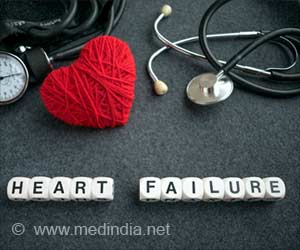University of Cincinnati (UC) researchers are focussing on regulating genes to look for new ways to prevent heart damage.
University of Cincinnati (UC) researchers are focussing on regulating genes to look for new ways to prevent heart damage.
A heart attack causes the cells die, which may lead to lasting damage to the heart. And now, researchers led by Keith Jones, PhD, a researcher in the department of pharmacology and cell biophysics are trying to reduce post-heart attack damage by studying the way cells die in the heart-a process controlled by transcription factors.Transcription factors are proteins that bind to specific parts of DNA and are part of a system that controls the transfer of genetic information from DNA to RNA and then to protein. Transfer of genetic information also plays a role in controlling the cycle of cells-from cell growth to cell death.
"We call it 'gene regulatory therapy,'" said Jones.
Till date, researches have identified the role for an important group of interacting transcription factors and the genes they regulate to find out if cells in the heart survive or die after blood flow restriction occurs.
Usually, scientists use virus-like mechanisms to transfer DNA and other nucleic acids inside the body. The "virus" takes over other healthy cells by injecting them with its DNA. The cells, then transformed, begin reproducing the virus' DNA. Eventually they swell and burst, sending multiple replicas of the virus out to conquer other cells and repeat the process.
And researchers are now investigating new, non-viral delivery mechanisms for this transfer of DNA.
Advertisement
He also said that the researchers have made this successfully work within live animal models and this delivery mechanism involves flooding the cells with "decoys" which trick the transcription factors into binding to the decoys rather than to target genes, preventing them from activating those genes.
Advertisement
He highlighted that this delivery has limitations and advantages, saying: "It can be used to block a factor at any point in time and is reversible. However, right now, a specific delivery route must be used to target the tissue or cell."
Now, the researchers hope that this new technology will allow them to directly address the effects of gene regulation in disease, as opposed to using classical drugs that treat symptoms or have significant adverse outcomes.
The results of this study will be presented at the International Society for Heart Research in Cincinnati.
Source-ANI
SRM










